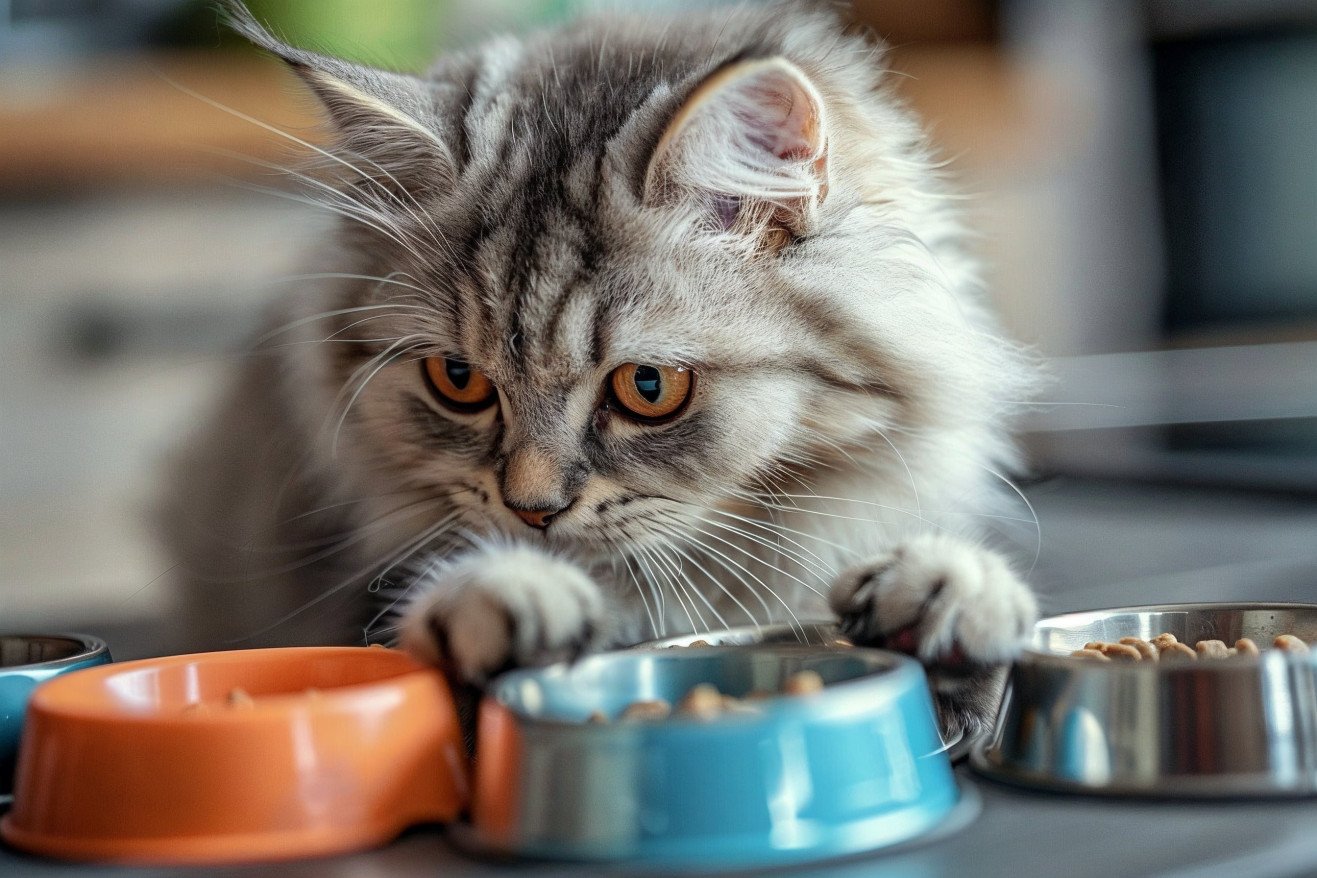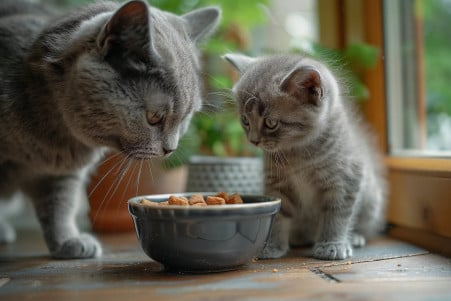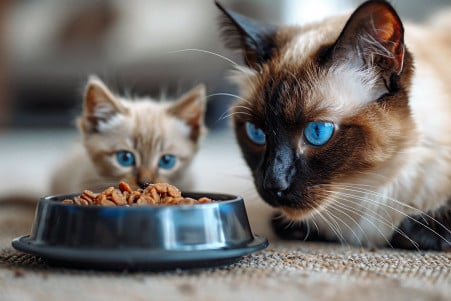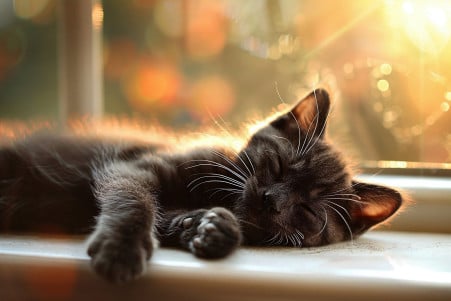When to Switch from Kitten to Cat Food: A Complete Guide to Your Feline's Best Health
22 April 2024 • Updated 22 April 2024

Knowing when to switch from kitten food to cat food is important for your furry friend's long-term health and well-being. The best time to switch from kitten to adult cat food is typically around 12 months of age, although some larger breeds may need to stick with kitten food a little longer. Kitten food is higher in calories to support growth, but adult cats have different calorie and nutrient needs to maintain a healthy weight.
To make sure you make the transition as smoothly and healthfully as possible, we've gathered advice from veterinarians and nutritionists who specialize in the dietary needs of cats. With their help, you can feel confident that you're making the right adjustments to your cat's diet as they grow up, taking into account their breed, body condition, and unique energy requirements. Knowing what your cat needs at each stage of life will help you ensure they're happy, healthy, and living their best life for years to come.
When should you switch a kitten from kitten food to cat food?
How to Tell When Your Kitten is Ready for Adult Cat Food
Most kittens will have reached their full adult size and weight by 12 months old, which is a good indication that they are ready for adult cat food. However, larger breeds like Maine Coons can take up to 18-24 months to fully mature and may need to remain on kitten food for longer. The most important thing to look for is when your kitten has reached 90% of their expected adult weight, says Forever Freckled. At this point, it's time to start transitioning them to an adult cat food.
It's important to watch your kitten's growth and body condition closely during this time. Talk to your vet to get a better idea of when you should start transitioning your kitten to adult food based on their breed, size, and how they're growing. You may also need to adjust the timeline if you notice that your kitten is having trouble gaining weight or is gaining too much. With the help of your vet, you can make sure that your kitten is ready to move on to an adult diet when the time comes.
How to Transition Your Kitten to Adult Cat Food Gradually
If you switch your kitten to adult cat food too quickly, it can cause digestive issues like vomiting, diarrhea, or loss of appetite, according to Purina. For this reason, it's best to take 7-10 days to transition from kitten to adult cat food.
ACANA suggests starting with a mix that contains 75% kitten food and 25% new adult cat food, then gradually increasing the percentage of adult cat food in the mix over the course of the transition period. Pay close attention to your kitten's reaction and adjust the schedule as necessary if they show any signs of distress. It's also important to note that some kittens may take longer to fully acclimate to their new adult cat food.
As mentioned by PetCareRx, a successful transition is important to avoid the gastrointestinal issues that can come with a sudden change in diet. To minimize the risk of digestive upset, a transition period of one to two weeks is recommended.
Nutritional Differences: Kitten vs Adult Cat Food
Kitten food is made with higher levels of protein (30-50%), fat (18-35%), and calories to meet the demands of a growing kitten, says Progressive. It also has higher levels of important vitamins and minerals, such as calcium, phosphorus, vitamin A, and vitamin D.
On the other hand, adult cat food has lower protein (about 26%), fat, and calorie levels to meet the needs of a fully grown cat, according to Catster. The exact nutrient content and ingredients can vary by brand, so it's important to look at the nutritional information and ingredient list when choosing an adult cat food.
That said, Feline Medical Clinic points out that there are some cases where it may be helpful for an adult cat to continue eating kitten food, such as if the cat is pregnant or underweight. Your vet can help you decide what diet is best for your cat.
How Wet Food Can Help
Kittens are weaned from their mother's milk to wet kitten food at 4-6 weeks old, Catster reports. Wet food can help make the switch to an adult cat food formula easier and more palatable for some kittens. The moisture in wet foods can also help prevent dehydration and support digestion while the kitten is switching to a new food, Hill's Pet notes.
Mixing wet and dry adult cat food formulas together can help kittens get used to the new food more quickly, Mud Bay explains. If your kitten is having a hard time adjusting to the new adult cat food, however, talk to your vet, who may recommend supplementation to help with the transition.
Troubleshooting Problems With the Food Change
Some kittens may have digestive problems like vomiting, diarrhea, or a lack of appetite when changing from kitten to adult cat food, says PetMD. If these problems last longer than 24 hours or are particularly severe, it's important to call your vet right away.
If your kitten is having trouble adjusting to the new food, Vets4Pets suggests slowing down the transition by adding more of the old kitten food. If your kitten refuses to eat or loses a lot of weight quickly, it's important to call your vet.
In some cases, your vet may recommend that you transition faster due to health problems like urinary tract disease, according to Only Natural Pet. Your vet can help you decide on the best timeline and method for transitioning based on your kitten's specific needs.
Conclusion: How to Help Your Cat Transition to a Healthy Diet for Life
Making sure you time the switch from kitten to adult cat food correctly at around 12 months of age is important for your cat's long-term health and weight. By taking 7-10 days to gradually switch your kitten to adult cat food, you can help your kitten's digestive system adapt to the new adult cat food formula.
It's also important to keep an eye on your kitten's growth, talk to your vet, and know how to address any problems that may come up. The right adult cat food will make sure your cat gets the nutrients they need in the right proportions to stay at a healthy weight and be healthy overall. If you're patient and attentive during this time, you can help ensure your cat gets the nutrition they need for the rest of their life.


